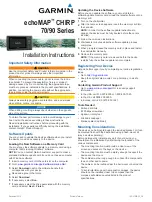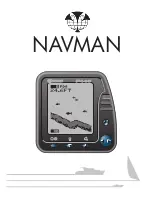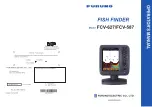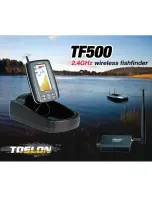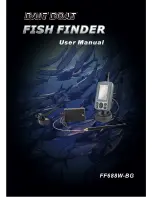
2
If necessary, extend the wires using 0.82 mm
2
(18 AWG) or
larger wire.
3
Connect the red wire to the positive terminal on the battery or
fuse block, and connect the black wire to the negative
terminal.
Connecting the Device to a Transducer
Go to
or contact your local Garmin dealer to
determine the appropriate type of transducer for your needs.
1
Follow the instructions provided with your transducer to
correctly install it on your boat.
2
Route the transducer cable to the back of your device, away
from sources of electrical interference.
3
Connect the transducer cable to the appropriate port on your
device.
Connecting the Cables to the Cradle
The connectors on the cables are keyed to fit only in the correct
ports on the device or cradle.
1
Compare the divots
À
on each cable connector to the keying
on each port to determine which cable corresponds to each
port.
2
Securely connect each cable to a port.
Installing the Device in the Cradle
If your device uses a cradle and you have connected the cables
to the cradle, you can quickly place the device in the cradle
without plugging in any cables.
1
Place the base of the device in the bottom of the cradle.
2
Tilt the device toward the cradle until it fastens in place.
There is an audible click when the device is secured in the
cradle.
Removing the Device from the Cradle
1
Press the release lever
À
on the cradle until the device is
released.
2
Tilt the device forward, and lift it out of the cradle.
NMEA 2000
®
Considerations
NOTICE
If you have an existing NMEA 2000 network on your boat, it
should already be connected to power. Do not connect the
NMEA 2000 power cable to an existing NMEA 2000 network,
because only one power source should be connected to a
NMEA 2000 network.
If you are installing a NMEA 2000 power cable, you must
connect it to the boat ignition switch or through another in-line
switch. NMEA 2000 devices will drain your battery if the NMEA
2000 power cable is connected to the battery directly.
NMEA 2000 compatible models can connect to a NMEA 2000
network on your boat to share data from NMEA 2000 compatible
devices such as sensors or a VHF radio. The necessary NMEA
2000 cables and connectors are sold separately.
If you are unfamiliar with NMEA 2000, you should read the
“NMEA 2000 Network Fundamentals” chapter of the
Technical
Reference for NMEA 2000 Products
. To download this
and select Manuals on the
product page for your device.
The port labeled NMEA 2000 on the back of the device is used
to connect it to a standard NMEA 2000 network.
NOTE:
Models that are not directly NMEA 2000 compatible
require the included 4-pin adapter cable to connect to the NMEA
2000 network.
Item
Description
À
NMEA 2000 compatible Garmin device
Á
NMEA 2000 drop cable
Â
NMEA 2000 power cable
Ã
Ignition or in-line switch
Ä
12 Vdc power source
Å
NMEA 2000 terminator or backbone cable
Æ
NMEA 2000 T-connector
Ç
NMEA 2000 terminator or backbone cable
Wiring Harness
• The wiring harness connects the device to power and NMEA
®
0183 devices.
• The device has one internal NMEA 0183 port that is used to
connect to NMEA 0183 compliant devices.
• If it is necessary to extend the power and ground wires, you
must use 0.82 mm
2
(18 AWG) or larger wire.
• If it is necessary to extend the NMEA 0183 or alarm wires,
you must use .33 mm
2
(22 AWG) wire.
3

